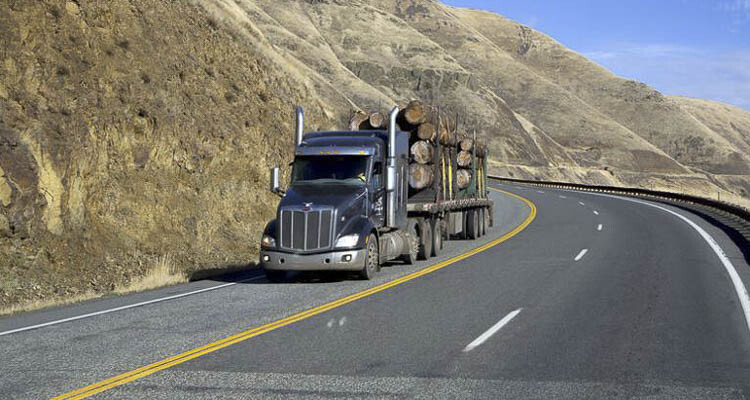
A dearth of truck parking capacity is a nationwide problem but is particularly acute in Washington, one of the most trade-dependent states in the country
Brett Davis
The Center Square Washington
The Washington Trucking Associations and its national counterpart, the American Trucking Associations, are urging Gov. Jay Inslee to tap into federal funding to address the state’s lack of big rig parking.
A dearth of truck parking capacity is a nationwide problem but is particularly acute in Washington, one of the most trade-dependent states in the country.
According to a September 2022 state Department of Transportation report on potential truck parking solutions, Washington has an average of 69 parking spaces per 100 miles of the National Highway System, compared to the national average of 142 spaces. That ranks the Evergreen State at No. 44 in the nation for the availability of truck parking.
In a Nov. 1 letter to Inslee, WTA President and CEO Sheri Call and ATA President Chris Spear point out the challenges faced by truckers – and other drivers on the road – who can’t find safe places to park.
“When drivers are unable to find safe, authorized parking, they are stuck in an untenable situation, forced to either park in unsafe or illegal locations, or violate federal hours-of-service regulations by continuing to search for safer, legal alternatives,” the letter states. “As a last resort, drivers reluctantly park in unsafe locations – such as highway shoulders, interstate entrance and exit ramps, and abandoned properties – creating heightened safety risks for themselves and other motorists.”
The letter asks Inslee to access federal funding in the Infrastructure Investment & Jobs Act, as well as U.S. Department of Transportation grants and non-federal funds to increase parking capacity and improve the operational efficiency of existing facilities.
Construction of new truck parking capacity at rest areas or adjacent to private facilities is eligible for funding, as are improvements that allow for increased parking capacity at nontraditional locations, such as weigh stations and commuter lots, when appropriate.
“The ask is $755 million from the feds; this was removed from the IIJA. While many grant programs consider truck parking eligible use of these funds, the projects compete with other infrastructure improvements which are always a higher priority,” Call explained in an email to The Center Square. “Currently there is a bill working its way through Congress (H.R. 2367, S. 1034) that would establish a competitive discretionary grant program and dedicate $755 million over the course of three years for truck parking projects across the country.”
State funds are also going toward addressing the lack of truck parking spaces, Call noted.
“The 2023 Washington transportation budget final contained $10.8 million for minor near-term improvements, and parking solution plan development which we hope will help with future appropriations for parking capacity increases,” she said.
She went on to say, “In 2021, the JTC [Joint Transportation Committee] completed a Truck Parking Action Plan. Several projects were identified including reconfiguring public rest areas to allow for more truck parking, incentivizing private investment or use of empty lots during off hours, to name a few.”
Inslee spokesperson Jaime Smith said the governor supports ongoing efforts at providing more truck parking spaces in Washington.
“The governor and WSDOT agree that additional truck parking space – safe parking spaces – is needed,” Smith emailed The Center Square. “The budget signed by the governor this past session includes the following truck parking-related provisos so we can work on this issue.”
Those provisos of this year’s $13.4 billion transportation budget include:
- $1.2 million “to evaluate safety rest areas along Interstate 5 and Interstate 90 for potential truck parking expansion opportunities”;
- $400,000 for the Freight Mobility Strategic Investment Board to develop an implementation plan for specific truck parking solutions;
- $2.5 million for WSDOT to coordinate with local governments and private entities to develop actionable recommendations for state assistance in developing specific candidates for truck parking sites;
- $1.8 million for WSDOT to pursue federal grant opportunities to develop and implement a technology-based truck parking availability system along the Interstate 5 corridor in partnership with Oregon and California;
- $5.95 million for implementation of truck parking improvements recommended by the Freight Mobility Strategic Investment Board.
“Truck drivers are the backbone of our society and our economy,” Call and Spear wrote in the letter to Inslee. “Without them, the daily conveniences we take for granted – from fresh water to fuel to the literal roofs over our heads – would not exist.”
Other signatories to the letter include Ryan Streblow of National Tank Truck Carriers and Jim Ward of the Truckload Carriers Association.
This report was first published by The Center Square Washington.
Also read:
- How Should Washington Taxpayers Handle TriMet’s Proposed Light Rail Costs? Share Your Thoughts!C-TRAN Board reviews TriMet’s proposal for Washington taxpayers to fund 45% of light rail operating costs, sparking local debate.
- Public invited to Online Open House Safe Streets and Roads for All Safety Action PlanRTC launches an online open house to gather community input for improving transportation safety across Clark County.
- Light rail cost and tax increase revelations cause significant concerns for C-TRAN BoardC-TRAN Board raises concerns over TriMet’s demand for Washington taxpayers to cover $7 million in annual light rail costs for the IBR program.
- Work on SR 500 pedestrian overcrossing in Vancouver freezes for winterWork on SR 500 pedestrian overcrossing in Vancouver pauses for winter; access closed until spring with free shuttle available.
- WA lawmaker says vehicle sales taxes are solution to transportation budgetA new proposal by Sen. Curtis King aims to redirect vehicle sales taxes to boost Washington’s transportation budget, addressing declining gas tax revenue.









